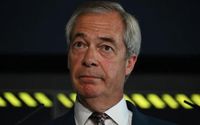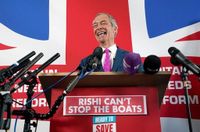Britain is in the throes of a heated debate about its future, as political leaders, lawmakers, and commentators clash over the state of the nation’s economy, migration policy, and the boundaries of free speech. At the center of this storm stands Nigel Farage, leader of Reform UK, whose recent condemnations of the government’s Online Safety Act and his continued rhetoric on migration have ignited controversy on both sides of the Atlantic. Meanwhile, Labour’s Chancellor Rachel Reeves has painted a similarly bleak picture—though for different reasons—while the public’s mood, according to recent polls, has rarely been darker.
The new Online Safety Act, which came into force on July 25, 2025, has become a lightning rod for debate. The law requires technology companies to verify users’ ages and use algorithms to detect harmful content. Its supporters, including Prime Minister Keir Starmer, argue that these measures are necessary to protect children from online abuse and dangerous material. Starmer insisted that Parliament would “protect free speech forever,” telling Sky News that the law targets only harmful content and does not endanger political expression.
Yet, critics see the Act differently. Farage, never one to mince words, called the legislation “dystopian” and promised to repeal it if Reform UK enters government. Senior Reform figures, such as former deputy leader Zia Yusuf, have argued the law does little to protect children and instead pressures tech firms to remove political content critical of the government. According to The Standard, VPN usage in the UK surged by more than 1,000% after the Act’s introduction, a statistic Farage and others point to as evidence that the law may simply drive young users to evade restrictions by turning to the dark web or virtual private networks.
Across the Atlantic, the Act has drawn the attention of US lawmakers. Republican committee members, led by Chairman Jim Jordan, warned that the legislation could restrict American-based platforms and conflict with First Amendment rights. Democrats, while acknowledging some positives in the law, expressed concern that vague language around “harmful content” could be misused by regulators. US lawmakers raised these issues directly with Ofcom, the UK’s communications regulator, warning that requirements to weaken encryption could set a dangerous global precedent.
The tech industry has also pushed back. Major firms like WhatsApp and Apple have voiced strong opposition to provisions requiring access points into encrypted services, arguing that such measures would compromise user privacy and cybersecurity. As euronews reported, these companies fear the UK’s approach could ripple across the globe, threatening the integrity of encrypted communications everywhere.
Since the law took effect, nearly 300 prosecutions have been brought for offenses including false communications and online threats, according to official statistics. Campaigners and civil liberties groups argue that the Act’s broad definitions of harmful content give regulators too much discretion to suppress speech. Technology Secretary Peter Kyle, however, has accused Farage of undermining child safety, warning that repealing the law could make it easier for abusers to target minors. Farage dismissed this as “disgusting,” according to The Guardian.
Beneath the regulatory wrangling lies a deeper divide between British and American philosophies on free speech. The UK government’s emphasis on child protection and public safety stands in contrast to US concerns about regulatory overreach and the sanctity of free expression. The controversy over the Online Safety Act has become a test case for how liberal democracies can balance the need to manage online harms with the imperative to maintain open discourse.
But the Online Safety Act is only one front in Britain’s ongoing culture war. Farage has also come under fire for his role in the so-called “small boats” migrant crisis in the English Channel. According to Nation.Cymru, Farage is blamed for contributing to the increase in dangerous Channel crossings following Brexit. The end of the UK’s participation in the Dublin Regulation—an EU agreement that allowed automatic return of asylum seekers to the first member state they entered—has left the UK unable to return migrants to EU countries without specific bilateral agreements, which are few and far between.
This legal gap has, perhaps inevitably, led to a surge in risky boat journeys. While the UK has a bilateral agreement with France, under which France is paid to apprehend migrants and the UK admits lawful migrants at a one-to-one ratio, right-wing media and social media have often blamed France for not doing enough. Farage, who was instrumental in bringing about Brexit, has been accused of exploiting the small boats issue for political gain while deflecting blame from Brexit’s role in the crisis.
The Labour Party, under Keir Starmer, has faced criticism for avoiding the topic of Brexit’s impact on migration and the economy. After the Brexit referendum and Boris Johnson’s “Get Brexit Done” victory, Starmer directed his MPs to support Brexit, a move that some say has compromised Labour’s credibility on these issues. Public opinion polls in August 2025 show only 29% of Britons would vote to stay in the EU if another referendum were held, indicating a nation still deeply divided over its European future.
Farage’s political fortunes, meanwhile, have been buoyed by his ability to tap into public fears about migration and societal decline. Some commentators warn that, if given the chance, he could pursue a “Trumpian” agenda, slashing public services and enacting policies that favor his party’s wealthy donors. “Farage’s successful exploitation of the small boats issue, leading millions to believe he is the hero rather than the villain of the piece, demonstrates what a dangerous demagogue he is,” wrote Martin Shipton for Nation.Cymru.
Amid these political battles, the British public remains deeply pessimistic. Both Farage and Labour’s Rachel Reeves have spoken in dire terms about the country’s prospects. Farage has warned of “societal collapse,” citing broken public services, immigration concerns, spiraling public debt, and stagnant living standards. Reeves, for her part, has described the situation as the “worst economic inheritance” since the Second World War. Yet, as The Telegraph points out, these doom-laden narratives may be overblown. While inflation is more persistent in the UK than in the US or Europe and the labor market is stalling, the economy is still growing, albeit sluggishly. The International Monetary Fund projects that the UK will outpace other major European economies in 2025 and 2026.
Still, the mood is grim. An Ipsos poll in August 2025 found that 68% of respondents expect economic conditions to worsen in the next 12 months—the most downbeat such finding recorded a year after a new government took office. The comparison to the 1970s, when Britain faced genuine economic and social upheaval, is common, but analysts argue that today’s challenges, while real, are not yet existential. The country’s fiscal situation is worrying, with high public debt and rising costs, but the risks are considered manageable compared to past crises.
In the end, Britain’s current predicament is as much about perception as reality. The debates over online safety, migration, and economic decline reflect a nation wrestling with its identity and its future. Whether the country can find a way through these challenges—or whether the doom-mongers will be proven right—remains to be seen. But for now, the battle lines are drawn, and the conversation shows no signs of quieting down.





